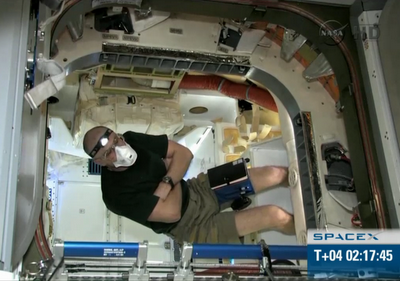It was my fourth time staying up almost all night watching SpaceX milestones on internet streams; finally, after a scrub, a launch, and a smooth capture, we were treated to a triumphant opening of the Dragon capsule hatch! I sleepily tweeted about the "success of the first commercially built and managed spacecraft to berth with the ISS as opposed to a government-run mission." Most of my SpaceTweep friends grokked the significance of the accomplishment, but I received one Tweet-Reply saying, "Actually, the NASA contract with the Russians is with Energia, a private company. But, why does commercial even matter?"
Happily, commercial matters because it just worked. However, it seems a few people misunderstand how this mission differs from past operations or contracts. Certainly, NASA contracts with hundreds of private companies, always has. Even Chrysler built missiles and boosters for the agency back in the day! The Federal Procurement Data System annually lists the NASA Top 100, detailing their actions and dollars spent, and each NASA center publishes lists of local contractors and sub-contractors. SpaceX is different. They are not contractors who hand over hardware or services based on agency-ordered specifications, whereby NASA takes possession and then runs the show. SpaceX ran their own show, as part of the COTS program, or the Commercial Orbital Transportation Services.
Sorting out COTS program details, like anything else in the space industry, is something of a "Death By Acronym" endeavour, but worth learning if we are looking at a new model for space exploration. COTS falls under NASA's Commercial Crew and Cargo program, affectionately known as "C3PO", and we're just assuming George Lucas never sued. The droid namesake invests and provides technical assistance to stimulate the private sector. Subtract the part where we have to lobby each presidential administration for funds, and fall mercy to potential changes in direction every 4 years at party whim or due to partisan political bickering.
[ Insert "lowest bidder" jokes here. ]
NASA had little to lose by inviting companies to join the major league with their own money, private investors, resources, ideas, and engineers into their arena. It actually frees them from managing the process, and encourages job opportunities in new sectors where NASA and other entities will eventually become customers. I have a friend at SpaceX who gave me a tour of their Hawthorne HQ. For the first time, I know someone in the space industry who sits at a Mission Control console who doesn't work for the government. No federal badge, but he nonetheless guided a CanadArm capture.
Other COTS participants, Orbital Sciences and Kistler Aerospace, have yet to demonstrate their inventions, but now that SpaceX has shown what can be done, space enthusiasts are hopeful that they are motivated to compete effectively. Are there downsides? Sure. SpaceX is 3 years behind schedule. The whippersnapper private industry, even while standing on the shoulders of 50+ years of giants, must undergo the process of learning what governments already know: what it takes financially, technically, logistically, organizationally and collaboratively, to put anything in orbit.
Another tangential development is the eccentric billionaire factor. Metaphorically, their eyes may often be bigger than their stomachs, but there are worse things obscenely wealthy individuals could spend their money on. If they choose rockets over sports teams and mansions, I say have at it. Maybe they selfishly want accolades, maybe they want to go down in history, or maybe some will altruistically want humanity to benefit from their willingness to experiment with new technologies, and ensure science continues in orbit or beyond.
Isn't that the human pioneering spirit that took us to space in the first place?
The difference now is that in terms of policy and administration of the process of space travel, the "Government Only" sign can now be taken down. COTS plans are transparent, as are those of the related Commercial Crew Development (CCDev) program, which includes Boeing, United Launch Alliance, Sierra Space, Paragon and Blue Origin corporations.
The Space Act Agreements and goals of each sector are public for anyone to peruse at their leisure. Our way of life, our level of science know-how, our new technologies, our ability to travel and communicate, our attempt to feed and water the 8 billion hairless apes crawling over this floating rock are all based on world space programs. What we have witnessed is a fundamental shift in how that process CAN be handled. Many thought it took a government to pull off, but that is no longer the case. Private industry CAN manage development of, manufacture and guide a ship into orbit to dock with international hardware. It's been done.
A milestone is a milestone, and it should not be minimized.






































































